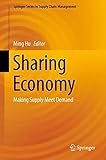Sharing economy : making supply meet demand [edited by] Ming Hu
Material type: TextSeries: Springer Series in Supply Chain ManagementPublisher: Cham, Switzerland : Springer, 2019Description: 1 online resourceContent type:
TextSeries: Springer Series in Supply Chain ManagementPublisher: Cham, Switzerland : Springer, 2019Description: 1 online resourceContent type: - text
- computer
- online resource
- 3030018636
- 9783030018634
- 334 23
- HD2963 .S53 2019
| Item type | Current library | Call number | Status | Date due | Barcode | |
|---|---|---|---|---|---|---|
| E-Resources | Main Library E-Resources | 334 Sh531 (Browse shelf(Opens below)) | Available | E003769 |
Includes bibliographical references
Introduction -- Impact of sharing economy -- Intermediary role of a sharing platform -- Crowdsourcing management -- Context-based operational problems in sharing economy
Available to OhioLINK libraries
This edited book examines the challenges and opportunities arising from today's sharing economy from an operations management perspective. Individual chapter authors present state-of-the-art research that examines the general impact of sharing economy on production and consumption; the intermediary role of a sharing platform; crowdsourcing management; and context-based operational problems. Sharing economy refers to a market model that enables and facilitates the sharing of access to goods and services. For example, Uber allows riders to share a car. Airbnb allows homeowners to share their extra rooms with renters. Groupon crowdsources demands, enabling customers to share the benefit of discounted goods and services, whereas Kickstarter crowdsources funds, enabling backers to fund a project jointly. Unlike the classic supply chain settings in which a firm makes inventory and supply decisions, in sharing economy, supply is crowdsourced and can be modulated by a platform. The matching-supply-with-demand process in a sharing economy requires novel perspectives and tools to address challenges and identify opportunities. The book is comprised of 20 chapters that are divided into four parts. The first part explores the general impact of sharing economy on the production, consumption, and society. The second part explores the intermediary role of a sharing platform that matches crowdsourced supply with demand. The third part investigates the crowdsourcing management on a sharing platform, and the fourth part is dedicated to context-based operational problems of popular sharing economy applications. "While sharing economy is becoming omnipresence, the operations management (OM) research community has begun to explore and examine different business models in the transportation, healthcare, financial, accommodation, and sourcing sectors. This book presents a collection of the state-of-the-art research work conducted by a group of world-leading OM researchers in this area. Not only does this book cover a wide range of business models arising from the sharing economy, but it also showcases different modeling frameworks and research methods that cannot be missed. Ultimately, this book is a tour de force - informative and insightful!" Christopher S. Tang Distinguished Professor and Edward Carter Chair in Business Administration UCLA Anderson School of Management
There are no comments on this title.

